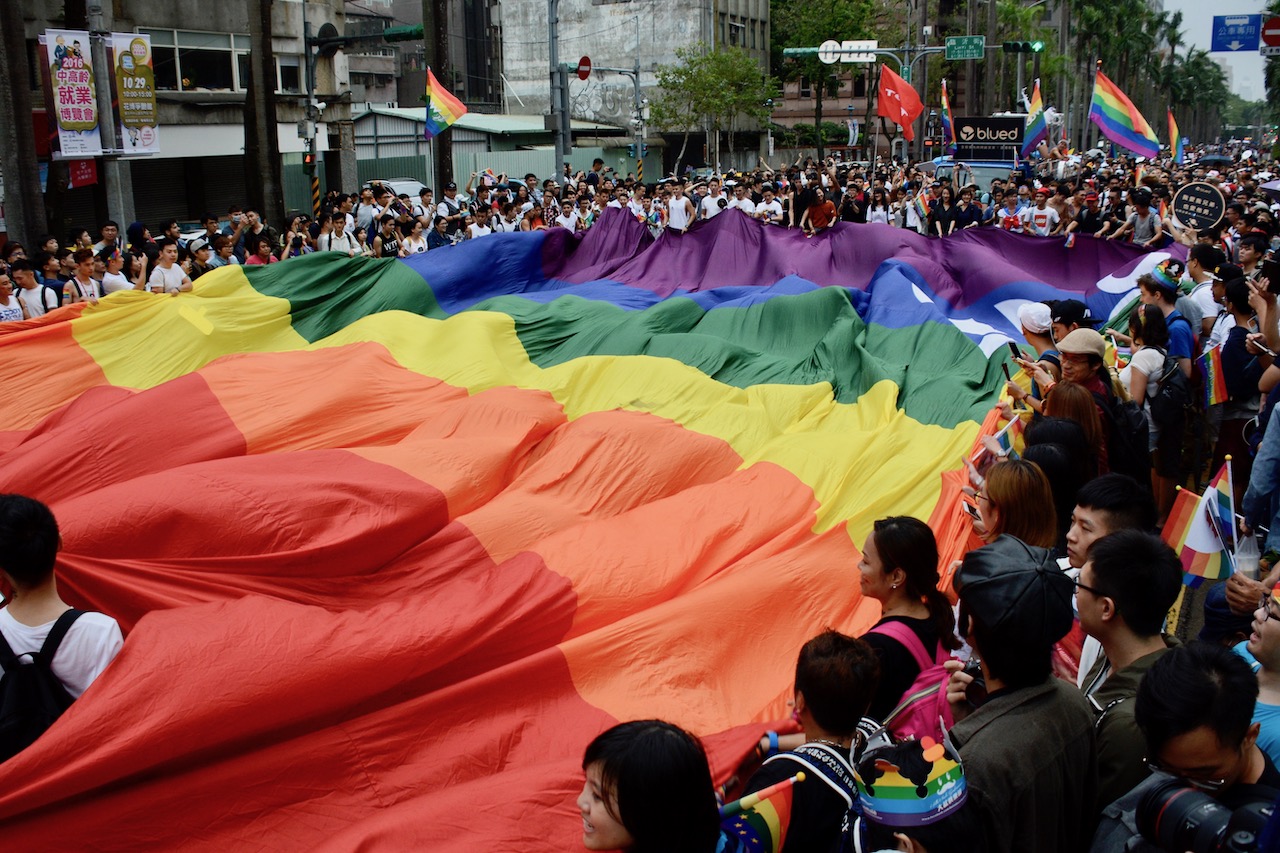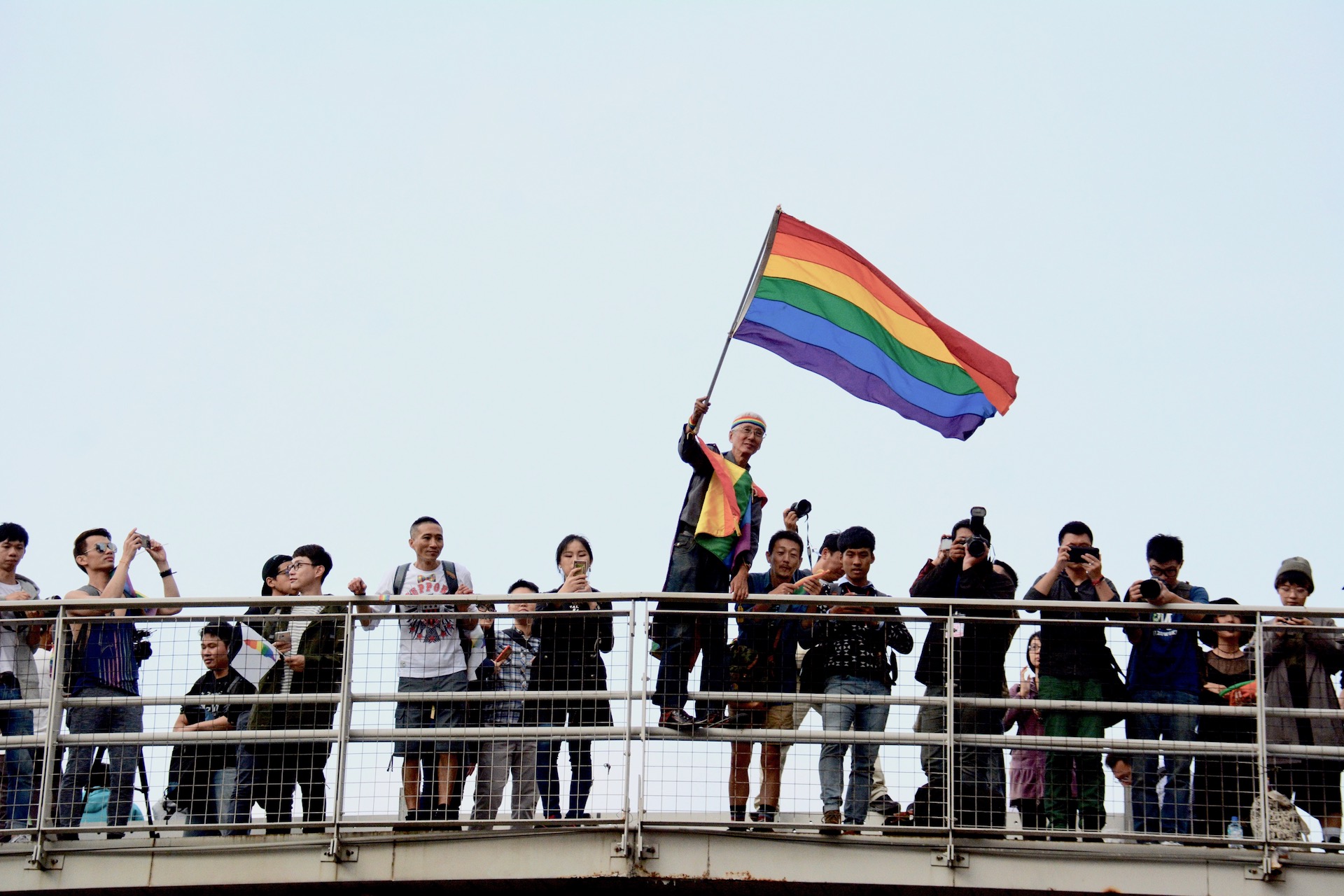Four foreign diplomats on Thursday shared their countries’ experiences with legalization of same-sex marriage with a Taiwanese audience. There’s a lot to be learned from those precedents, and a few things that President Tsai herself should pay heed to.
The election of Tsai Ing-wen of the Democratic Progressive Party (DPP) and her party’s securing a majority of seats in the January 2016 elections created much optimism within the LGBTQ community about the prospects of soon achieving marriage equality in Taiwan. Much of that enthusiasm stemmed from the fact that marriage equality was a major item in the DPP’s slick election campaign, so much so that after her election, several international media were headlining Taiwan as the first country in Asia likely to legalize same-sex marriage.
Since President Tsai entered office on May 20 last year, some progress has been made on the issue, but the pace has been much slower than expected. After undergoing some modifications, a bill has made its way up the legislative process, and the case has also been brought before the Council of Grand Justices, which will render its verdict on on May 24.
But it’s not going to be a shoe-in as some expected. Much of this can be attributed to the scare campaign orchestrated by groups opposed to legalizing same-sex marriage. Like LGBTQ activists and their supporters, the “anti” camp, led by conservative Christian churches and ideological allies in the U.S., also concluded that with control of both the executive and legislative branches of government, the DPP could, if it so chose, deliver on its campaign promise and make marriage equality a reality in Taiwan. The opposition therefore upped the ante in late 2016 by intensifying the rhetoric and holding a series of protests outside the Legislative Yuan and in front of the Presidential Office. Those groups were also soon joined by hardcore Kuomintang (KMT) supporters who saw the issue as one on which to attack the Tsai administration.
The scare tactic seems to have worked. It’s not so much the physical assaults on members of the LGBTQ community, or the litany of disasters, repeated ad nauseam by religious fear mongers, that would supposedly tear Taiwanese society apart — AIDS, bestiality, incest, rape, promiscuity, zero birthrate, and so on — that has had an impact on the matter. Rather, the real fear is the fear that has been struck inside the hearts of politicians at the Presidential Office. Like most of us, President Tsai and her advisers surely know that the warnings issued by the “anti” camp about the nefarious effects of legalizing same-sex marriage (and providing sexual education in schools) on society are poppycock (or downright hate speech, if you ask me). Instead, the Tsai administration appears to have convinced itself that the political costs of delivering on its electoral promise would be too high. What it boils down to, therefore, is votes, and the cycles being what they are, we know that politicians are already busy sharpening their knives and stretching their facial muscles in preparation for the 2018 and 2020 elections.
What this all comes down to is leadership at the top: the executive branch must set the tone, which will in turn affect the dynamics across society, including at the legislature.
What probably sealed the deal is the Presbyterian Church of Taiwan, long associated with the DPP, which abandoned its long, noble tradition of siding with the oppressed by joining the ranks of those who oppose legalization. In Tainan, considered the heartland of the DPP, the Presbyterians have even threatened to initiate recall campaigns against DPP politicians who openly support same-sex marriage. So the administration backed down and began dragging its feet, disappointing not only the many people in Taiwan who hoped the campaign promise was more than a mere electoral tool, but also international society, which was looking forward to Taiwan demonstrating yet again that it is a pioneer of human rights in Asia (“A backlash against same-sex marriage tests Taiwan’s reputation for gay rights,” read a Washington Post article on April 20).
In truth, and despite the fear that seems to have descended like a cloud at the Presidential Office, the whole thing is survivable. Over the years, support for legalization in Taiwan has remained steady and above 50%, with another 20-25% having little opinion on the matter. Among youth, more than 80% favor legalization. Therefore, those who oppose same-sex marriage account for no more than 25%, and Christians for a puny 5-6%. It is already known that the majority of those who oppose same-sex marriage are committed KMT voters. Thus, in election time, whether the Tsai government legalizes same-sex marriage or not would have no incidence on voting decisions within that group. Moreover, within the green camp and the influential Presbyterian church, legalization also is unlikely to affect voting patterns; it is difficult to believe that the Presbyterian base would break with the DPP on that single issue and decide to punish it by voting for the KMT.
What this all comes down to, therefore, is leadership at the top. The executive branch must set the tone, which will in turn affect the dynamics across society, including at the legislature.
In addition to that, education must play a larger role to dispel the myths that can only continue to exist because of the oxygen provided by ignorance. The best way to slay those dragons is to turn to historical precedent; in other words, to learn from societies that have already legalized same-sex marriage — not only to learn how they got there, but to see what happened to those societies after legalization (spoiler: no disasters, and the children, in whose name opponents of same-sex marriage purport to agitate for, are safe).
This is what the Marriage Equality Coalition (婚姻平權大平台-相挺為平權,全民撐同志), a pro-LGBTQ organization, set out to do on Thursday night with an event titled 婚姻平權通過後,加法英美各國經驗分享談 (“Experience Sharing Forum: Legalization of Same-Sex Marriage and Beyond”) at the W Hotel in Taipei. Sponsored by the government-funded Taiwan Foundation for Democracy and the W Hotel, the event featured four foreign diplomats who gave presentations, in Mandarin, about their respective countries’ journey toward legalization and the consequences, social and political, of having done so. Charmaine Stanley, Anne Rulliat, David Snower and Michael Pignatello represented the governments of Canada, France, the U.K. and the U.S. respectively. Two legislators who have pushed for gay marriage legislation in Taiwan, Yu Mei-nu of the DPP and Jason Hsu of the KMT, also attended the event, as did several activists and journalists.

From left: Ketty Chen (Vice President, Taiwan Foundation for Democracy), David Snower (British Office Taipei), Anne Rulliat (Bureau français de Taipei), Michael Pignatello (American Institute in Taiwan), Charmaine Stanley (Canadian Trade Office in Taipei) and Jennifer Lu (research fellow with the Taiwan Tongzhi Hotline and host of the event). (Photo: J. Michael Cole)
A narrative line that ran through all four presentations is that getting there wasn’t easy. It took several years — decades, in some cases — of activism by LGBTQ and civil rights activists (as Pignatello pointed out, marriage equality is part of and cannot be dissociated from the civil rights movement) before their governments summoned the courage to do the moral thing by giving same-sex couples the same rights as the rest of us. In all the countries involved — all four are “mature” democracies — opposition to legalization was much more serious and pervasive than it is here; and unlike Taiwan, where it is largely Christian-led, it was multi-denominational. The key lesson is that the governments took risks, and they survived. Not only that, but the societies continued to thrive. Whatever threat children in those countries face isn’t so much related to individuals of the same gender being able to marry each other, but rather to firearms, substance abuse, car accidents and other social ills that plagued our societies well before LGBTQ even became a household acronym. Furthermore, however well or poorly the ruling parties did in subsequent elections most assuredly wasn’t the result of having legalized same-sex marriage.
By agreeing to share their countries’ experiences with a Taiwanese audience (no doubt with permission from their foreign ministries and departments back home), those fine diplomats did Taiwan a great service. They showed the LGBTQ community that their travails and frustrations are not unusual: what we’ve been seeing in Taiwan is no aberration; it has happened before, mass prayer sessions and doomsday scenarios included. Activists must therefore not give up hope in the face of a vocal (and increasingly vicious) opposition or government foot-dragging.
Hopefully, their message will also trickle upstairs and reach the ears of President Tsai and her advisers, who also need to learn about those experiences. What those case studies tell us — and more importantly what they tell President Tsai — is that leadership involves risk-taking. Sometimes a leader needs to put his or her foot down, ignore the noise, avoid false moral equivalences (a recipe for inaction), and do what’s right. President Tsai, who could certainly do with a policy success right now, needs to know that she can take that extra step and survive to see another day.

DPP Legislator Yu Mei-nu, left, and KMT Legislator Jason Hsu listen on as four foreign diplomats share their countries’ experience with legalizing same-sex marriage at the W Hotel in Taipei on April 27 (Photo: J. Michael Cole)

Anne Rulliat of the Bureau français de Taipei talks about France’s road to legalization of same-sex marriage (Photo: J. Michael Cole)

Charmaine Stanley of the Canadian Trade Office in Taipei talks about Canada’s experience in legalizing same-sex unions (Photo: J. Michael Cole)

Michael Pignatello of AIT discusses the American road to legalization of same-sex marriage (Photo: J. Michael Cole)

David Snower of the British Office Taipei walks the audience through the British experience with same-sex marriage (Photo: J. Michael Cole)
You might also like
More from Society & Culture
Media and Free Expression in Taiwan Are Under Attack: What Can be Done?
How can we avoid the imposition of a blanket silence which can only empower our enemies and damage our democracy? …
Taiwanese Views on Homosexuality Based on Proximity of Relationship, Study Shows
The legalization of same-sex marriage in Taiwan should be viewed not just as a culmination of years of advocacy efforts …
Challenges Remain Following the Legalization of Same Sex Marriage in Taiwan
Despite the adoption of a new law on May 17, campaigns will continue to legitimize the kind of homophobic discourse …









